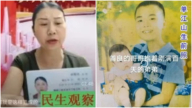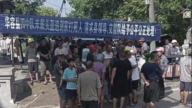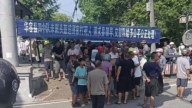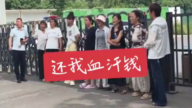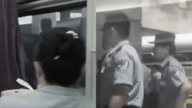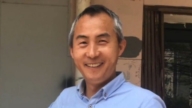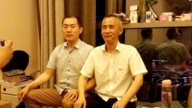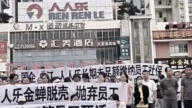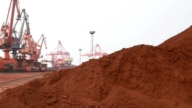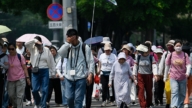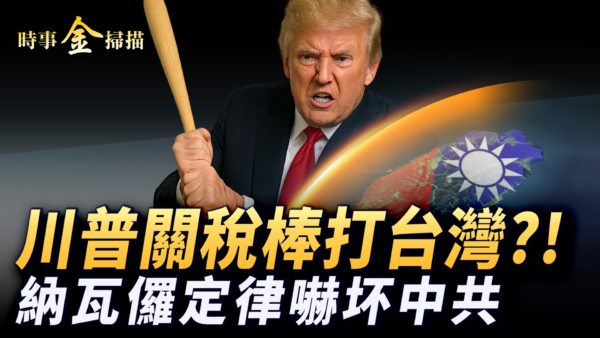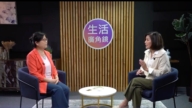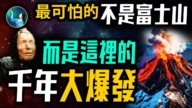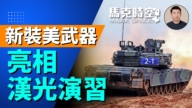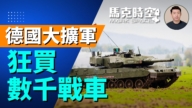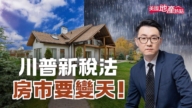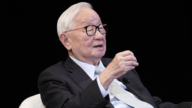【新唐人2014年05月14日讯】工会,又被称作“工人联合会”,原本是为了维护工人权益而建立。但是在中国大陆,官办工会却被劳动者们称为“纸上工会”,大多数劳工在权益受损时,宁可选择罢工,也不愿求助工会。直到一名女工将大陆唯一的官办工会——中华总工会,以“不作为”的理由告上了法庭,才引发各界对工会制度名存实亡的思考。
近年来,随着大陆工人对自身权益的了解不断增加,维权意识也日益高涨,致使越来越多的地区爆发罢工和工人运动事件。据劳工权益组织——“中国劳工通讯”公布的数据显示,今年年初以来,大陆出现的罢工数量比去年同期多出三分之一。
令外界关注的是,大陆几乎所有群体性工人罢工事件,都绕开工会进行。原本应该负责在企业与员工间进行沟通,帮助工人向企业争取合法权益的工会组织,在劳资双方发生纠纷时,却鲜少介入。
大陆“大学师生监察无良企业行动”干事梁佩筠:“因为现在这么多的罢工,我们就会看到其实工人也有一个意识,就是他们的权益受危害的时候,他们也知道他们要站出来。但是可能中间没有一个畅通的渠道,让劳资双方来做一个协调或者沟通。”
大陆劳工们不禁质问,拥有近3亿成员,每年会费收入数百亿的官办工会——“中华全国总工会”的存在,究竟有什么意义?
去年7月23号,被美国跨国零售企业“沃尔玛”开除的大陆女员工王亚芳,将深圳的“中华全国总工会”分支机构告上法庭。理由是在她被解聘过程中,工会没有尽到应尽的义务,导致她名誉受损。
据报导,2011年,深圳一家“沃尔玛”商场以“不诚信”的理由,解雇了工作9年的女收银员王亚芳。而单位工会在王亚芳求助时,不但拒绝帮忙,而且对“沃尔玛”解聘她的决定没有做出任何异议,不经调查就立刻盖章确认,导致她的名誉权受到损害。
代理这一案件的律师何远程在接受美国《纽约时报》等外媒采访时表示,“中华全国总工会”在保护劳工权益和利益方面严重失职,这项指控得到了许多中国劳工支持。他们希望借助这个案件对中国的工会体制进行“敲打”,希望工会能够真正代表员工的利益。
梁佩筠:“我们也是希望在企业的层面来说,按照中国《工会法》,可以允许中国工人来选出他们自己工会的代表。”
有分析指出,虽然中国大陆地区有着大量的工会组织,但劳动者们普遍认为这些工会早已名存实亡,沦为“纸上工会”。实际上中国真正的工会只有一个,就是“中华全国总工会”,各个城市的总工会以及企业的工会,其实都是“中华全国总工会”的分支机构,而且全部在共产党领导之下,工会的首要职责是与政府保持一致。
深圳“春风劳动争议服务部”负责人张治儒:“中国目前的官方工会,可能是因为体制的原因,导致它没有什么作为。其实我们应该知道,作为一个工会组织,应该是独立的,不应该成为一个政府的附庸。”
大多数国家的工会是由工人本身成立,而中国的工会已经成为企业内部的一个组织部门,工会的人事任免往往由企业管理层决定,而不是由员工选出。国有企业的工会成员甚至直接由政府部门任命。这样一来,当劳方和资方发生纠纷时,工会代表的往往是资方的利益,而不是工人的权益。
张治儒:“他们(工人)权益被侵犯,是因为他们确实没有自己的维权组织、没有自己的代表。但是因为他们在中国这个政策之下成立了工会,必须受官方工会的领导。所以说,就是成立了工会组织也很难发挥作用。因为官方工会是你领导、是你的上级机关,一个它不会支持你去维护工人的利益、权利。第二个,它也可能会阻止你去维权,其实官方工会不只没有起到给工人维权的作用,反而起到对工人维权不利的一些作用。”
对于外界普遍指称的,中国只有“纸上工会”一说,大陆劳动者的回答是:不敢替劳动者维权的工会要来何用?
采访编辑/张天宇 后制/舒灿
What is the purpose of “paper unions" in China?
Unions, also known as “Workers Unions" were originally
established in order to protect the interests of workers. But in
China, the government-run workers unions have been called
“paper unions". When most workers’ interests are damaged,
they would prefer to strike, instead of seeking help from the
union. Recently a worker in the mainland sued the government-
run unions – China Federation of Trade Unions giving “doing
nothing" as a plea to the court. This case leads all walks of life to
think of trade unionism in China – as in name only.
In recent years, with increasing awareness of mainland
workers about their rights, more and more strikes and workers’
movements break out in different areas. According to labor
rights organizations – “China Labour Bulletin" released at
the beginning of this year, the number of strikes grew by one-third
more than last year.
To the concern of the outside world, almost all groups of workers
strikes in the mainland bypass the unions that are supposed to
be responsible for communication between enterprises and
employees, to help workers get their legitimate rights. However,
they rarely get involved in labor disputes between the two sides.
Liang Peijun, the administrative secretary of the “Students and
Scholars Against Corporate Misbehavior" said: “There are so
many strikes now, we will see the workers actually have a sense
of protecting their interests. They know that they should stand
up when their interests are compromised. However, there is no
smooth channel in the middle to allow employers and employees
to coordinate or communicate."
Mainland workers will ask what is the significance of the
“ACFTU". There are nearly 300 million members and its
annual income reaches tens of billions.
On July 23 last year, Wang Yafang, a female employee who
was dismissed from Wal-Mart – the U.S. multinational retail
company, sued the “ACFTU" branch in Shenzhen in the court.
The reason was in the process of her dismissal, the union did not
fulfill its obligations. Therefore, her reputation was lost.
According to reports, in 2011, a Wal-Mart shopping mall in
Shenzhen dismissed Wang Yafang by reason of “bad faith".
Wang Yafang was a female cashier and had worked there for 9 years.
Wang tried to get help from the union but the union refused to help.
The union did not make any objection to the dismissal decision
and rubber-stamped it immediately without any investigation. Wang’s
reputation was damaged after that.
He Chengyuan, the lawyer in the case said to New York Times
that there are serious derelictions of duty by the ACFTU, specially
in the protection of labor rights and interests. This allegation was
supported by many Chinese workers. They want to take up this case
to “beat" the Chinese trade union system. I hope the union can
truly represent the interests of employees.
Liang Peijun: “We also hope that the enterprise will allow
Chinese workers to elect representatives of their own union,
according to ‘Trade Union Law’."
Some analysts pointed out that although mainland China has a
large number of trade unions, workers generally agreed that
these unions have long existed in name only. They are the
“paper trade unions". In fact, the only one union is ACFTU. The
labor unions in various cities are ACFTU branches. They are all
under the leadership of the CCP. The primary responsibility of
trade unions is to be consistent with the government.
Zhang Zhiru, the leader of “Spring Labor Dispute Service" in
Shenzhen said: “The official trade union in China does nothing,
probably because of institutional reasons. In fact, we should
know that as a trade union organization, it should be independent,
instead of a vassal of the government."
Unions in most countries were established by the workers
themselves. In China, it has become a trade union sector within
the enterprises. Appointment and removal issues are often
decided by the corporate management, rather than by the election of
employees. In the state-owned enterprises, the union members
are even directly appointed by the government. As a result, when
there is a dispute between employers and employees, the union
representatives will pay attention to the interests of employers,
rather than the interests of workers.
Zhang Zhiru: “Their (the workers) rights have been violated,
because they do not have their rights organization and
representatives. However, according to the policy in China, the
union they established must be under the leadership of the
official trade unions. Therefore, the unions could hardly play a
role. The official trade union is your leader, your superior
authority. First, it will not support your interests and rights.
Second, it may prevent you from protecting your rights. In fact, the
official union does not play any role in protecting the workers’ interests,
but produces an adverse effect on workers rights."
It is so widely alleged that there are only “paper unions" in China,
mainland workers’ question: “What is the purpose of
these ‘doing nothing’ unions?"
Interview & Edit/Zhang Tianyu Post-Production/Shu Can


